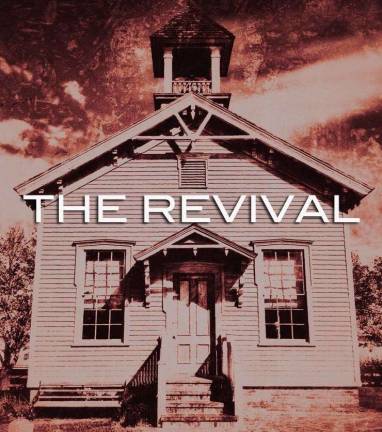IndieGoGo Helps Revival Film Find Signs of Life

By Doug Strassler The Revival was a carefully nuanced, eye-opening play that had a too-short run on the New York stage back in 2010. Playwright Samuel Brett Williams fashioned a sensitive and honest look at religion in the Deep South, and the lengths people go to in the name of faith. NYP caught up with Williams, currently working to build up enough finances to film a movie version of The Revival on IndieGogo. NYP: Explain a bit more about the genesis of The Revival. What can you share about the plot? SBW: The Revival is about Eli, a young southern Baptist preacher who takes over his father's church. He was educated at Harvard, and he wants to bring what he believes is a more progressive faith to his small Arkansas town. Trevor, the financial administrator, is trying to get the church into the Southern Baptist Board of Churches, which would provide all sorts of funding and media opportunities. This in turn could lead to increased attendance and revenue, creating a mega-church that would be run like a corporation. Enter Daniel, a young, troubled drifter, who is running away from some pretty big secrets. Eli takes Daniel in and eventually falls in love with him. This forces Eli into a love triangle between Daniel, himself, and God. NYP: Tell me about this Indiegogo campaign. When do you plan to start filming, and what kind of release/distribution are you intending for? SBW: So far we have raised just over twenty-one thousand dollars. Our goal is at least twenty-five thousand for the Indiegogo campaign. We are looking to shoot the film early next year for around two hundred and fifty thousand dollars. All told, [actors and co-producers] Jake Silbermann, Malcolm Madera, and myself are looking to raise seventy thousand dollars so we can maintained artistic control over the project. NYP: What are your own thoughts on religion? What is the difference, to you, between religion and spirituality? SBW: I was born and raised in Hot Springs, Arkansas. I attended a Southern Baptist private school from kindergarten through high school, and then I attained my undergraduate degree at Ouachita Baptist University. I grew up immersed in religion. The more I became involved in the system, the more I saw people manipulate it to benefit themselves. Anything that can provide money and power will have corruption. Now, spirituality is certainly its own thing. It seems to me that spirituality is a communication between yourself and something much bigger than yourself; something that can not be contained in words or even rational though. I have actually found more spirituality in small theatres than in big churches. NYP: And why do so many people place such importance on faith? SBW: I have always found it deeply fascinating how people put their faith into a box that is limited to their own perceptions. I mean, you can sit in a church service and personalize the sermon to mean one thing, and the individual next to you will personalize it to mean something else entirely. In the movie, Eli talks to his congregation about the fact that modern Christians have personalized their God to the point where they think their own inner voice is God. They think the voice that tells them they forgot to turn off the television in the other room is Jesus Christ himself. I find this incredibly troubling. Because when people start thinking that their own desires and impulses are God talking to them ? well, it gives them a way to justify selfish actions, even those that harm other people. NYP: Why do you think religion often plays a more prominent role in people's lives in the South? SBW: I don't know if people understand the pervasive poverty in the south. A character in another one of my Arkansas plays says, "Believin' ain't hard when believin' is all ya' got." Now, I'm certainly not saying religion is all people have in the south. It is a rich, vibrant community, one which I try to visit multiple times a year. However, like anywhere, there are people who seem to use religion to justify lives they do not want to be living. In the movie, June (Eli's wife) says that they aren't living for this life ? pleasure in this life means nothing; it's just a distraction ? what they should be living for is their eternal life. NYP: What are the biggest challenges with this project? SBW: Even though I am a producer on this project, my biggest concerns are always going to be artistic. I just want to make certain that at every moment I am telling a relevant, important story as clearly and compellingly as possible. NYP: What excites you most about the film? SBW: How much it scares me. For more information on The Revival and other projects, go to http://www.samuelbrettwilliams.com/therevival.html.